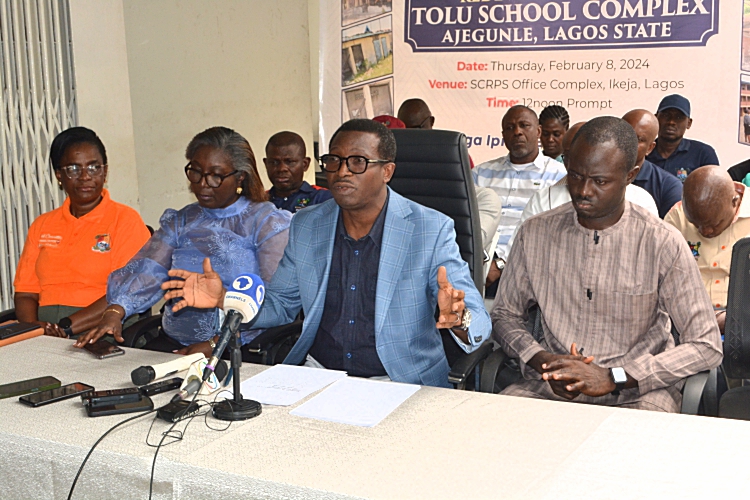...To get all news updates, Join our WhatsApp Group (Click Here)
Also Join our WhatsApp Channel (Click Here)
The Special Committee on Rehabilitation of Public Schools, as part of its mandate to improve the performance of pupils, stated that it has rehabilitated about 246 public school buildings while 1,047 new classrooms have been injected into the schools system.
The Committee, in a bid to further encourage all-round students, has built recreation facilities like football pitches, multi-purpose courts and race tracks in some of the schools and the redevelopment of Tolu School Complex.
This was disclosed by the Chairman of the committee, Mr Hakeem Smith, on Thursday, during a media briefing held in Ikeja, on the redevelopment of Tolu School Complex, Ajegunle, Lagos.
Speaking further, he noted that there was a need to focus on the rehabilitation of the schools so as to help build capacity in the area of Science, Technology, Sports and the redevelopment of Tolu School Complex.
He noted that in line with the mandate given to the SCRPS at its inauguration in November 2019, by the governor of the state, the committee was saddled with the responsibility of aggressively revamping the infrastructure in all Lagos public schools, so as to improve teaching and learning, adding that the committee has regularly been carrying out the responsibilities with a visible result noticeable in all the education districts.




He said: “I sincerely welcome you all to this Media Briefing holding today, Thursday 8th of February 2024. This meeting became necessary in order to keep the media abreast of what we are doing at SCRPS and also to roll out what this office intends to carry-out in terms of schools projects in the year 2024.
“In line with the mandate given to the Special Committee on Rehabilitation of Public Schools (SCRPS), at its inauguration in November 2019, by Mr Governor, SCRPS was to aggressively revamp the infrastructure in all Lagos public schools, so as to improve teaching and learning, which eventually improve performance of our pupils. This directive was regularly carried out by this office with a visible result noticeable in all the education districts.
“As at today, we have rehabilitated about 246 public schools buildings while 1,047 new classrooms have been injected into the schools system. Also, about 1,593 bed hostel have been provided in the schools while over 200,000 unit dual composite furniture were also provided in the schools including Principal and Teachers’ furniture.
“To encourage an all-round students, there has been provision of purpose built recreation facilities like football pitches, multi-purpose courts and race tracks in some of our schools.
“In order to provide a 21st century school, there is the introduction of technology driven teaching environment through the use of interactive screen and hand-held tablets by students. This was built at Vetland Grammar school, Agege and currently been built in the other education districts in the state.
“Sometime in 2022, SCRPS rehabilitated two numbers of 17+1 classroom blocks in Tolu complex. This intervention instructed by Mr Governor exposed the state of disrepair of most of the school blocks and the classroom inadequacy in the complex. A comprehensive assessment was instructed by Mr Governor which led to the regeneration we have just commenced in the complex.
BRIEF HISTORY OF TOLU COMPLEX.
I feel it is appropriate to let you in into a brief history about the place.
The land mass presently known and identified as Tolu School Complex was established im 1981 by Alhaji Lateef Kayode Jakande Administration. In propagating his Mass Education policy, the state government at that time reclaimed the subject parcel of land from the Lagos lagoon. This was necessary due to the dense population of the area and the lack of suitable space for the establishment of public schools.
The complex itself was in two parcels separated by Temidire street covering an expanse of approximately 11.73 hectares. Parcel A covers 10.61 hectares while Parcel B measures 1.12 hectares.
The school complex started off with just two schools: then called School 1 and School II, after which they were renamed Unity Secondary School and Olodi Apapa Secondary School respectively. In 1982/1983, some other schools came up namely : Adeolu Secondary School, Newland Secondary School, Ojoku Secondary School, Ojora Memorial Secondary School and Oshodi Secondary School.
During the era of Air Commodore Gbolahan Mudashiru who was Lagos state Governor from 1984-1986, he continued the work of his predecessor in improving school infrastructure by upgrading the existing Jakande blocks to standard ones and more schools were added to the ever- growing community.
In continuing to trace the history of Tolu School Complex, the other events worthy of note would definitely be the construction of Bola Ige Millenium Secondary School during the administration of Asiwaju Bola Ahmed Tinubu and also the Federal Ministry of Education policy in 2003 which mandated the creation of Junior and Senior Secondary Schools. This policy led to the establishment of even more schools in the complex.
At the moment, we have thirty-six (36) schools within Tolu Complex which are distributed as follows:
- 5 Primary Schools,
- 15 Junior Secondary Schools.
iii. 16 Senior Secondary Schools.
POPULATION:
- 9,191 – Junior Secondary Schools.
- 8,457 – Senior Secondary Schools.
iii. 2,066 – Primary Schools
Having been in existence for decades and been subjected to intense usage, the existing classroom blocks within the complex are obviously in different stages of dilapidation. From the ones requiring rehabilitation to the ones that need to be demolished and re-developed.
The complex comprises of several existing structures housing all the schools above and four existing Access Roads, Lagos State Water Corporation Storage, the John Ighalo Football Pitch and other amenities like Food sheds/ Kiosks which are boarded by the lagoon.
SCRPS INTERVENTION AND PROBLEMS IDENTIFIED AT TOLU COMPLEX.
During the several reconnaissance/ assessment visits to the Tolu Complex by SCRPS Officials, the following problems were identified:
- High Student/classroom ratio which is not conducive for learning.
- The pressing need for additional classroom blocks.
- Most of the existing blocks require urgent rehabilitation as the blocks are in various stages of dilapidation.
- Lack of recreational facilities, laboratories, teachers and principals’ offices, toilets etc.
- Non-clearly defined boundaries within the school, encouraging inter-school scuffles and fights.
- Inadequate access roads within the complex.
- Recurrent issue of flooding within the entire complex.
- Security issues in form of School Break-ins, Theft etc.
- Non availability of ICT infrastructure within the complex.
- Lack of perimeter fencing- allowing incessant activities of miscreants within the area.
- All these deficiencies in standard requirements necessitated the need to regenerate the entire complex.
PROJECT IMPLEMENTATION – METHODOLOGY AND APPROACH.
METHODOLOGY:
- Temporary relocation of students within the complex.
- Breaking the projects into manageable LOTS.
- Procurement Process and Contract Awards.
- Project Monitoring, Supervision and Evaluation
- Project Completion and Close out.
APPROACH:
For efficient management, supervision and to ensure timely delivery. The project was divided into six (6) lots. That is Lots A, B, C, D, E, F.
Furthermore, it was agreed upon that the categorization of projects into Lots will make it easier to get work done, being that most schools within the complex will be in session as at the time work starts. Also, arrangements have been made to assuage issues where students will need to be temporarily relocated within the school complex.
PROPOSED SOLUTIONS FOR THE REDEVELOPMENT OF TOLU COMPLEX.
To make Tolu Complex a state-of-the-art Education City. SCRPS is therefore proposing the following:
- Construction of Additional 13 Nos 15/18 Classroom blocks with offices and toilets in some of the schools having shortage of classrooms.
- Renovation of identified dilapidated classroom blocks.
- Construction of perimeter fence and gate houses.
- Construction of New inner roads and drainages.
- Rehabilitation of Existing Access Roads.
- Construction of Health-care center.
- Construction of a Fire service station.
- Construction of Multi-purpose sports complex.
- Construction of Facility Management Office.
- Construction of other External works i.e .Gates, Food sheds/Canteen etc.
- External Electrical Works-Solar powered flood light.
- Provision of an all -inclusive school to accommodate people with disability.
- Provision of land for the ICT hub, central laboratory and arts/ creativity blocks under private sponsorship arrangement.
REASONS FOR THE REDEVELOPMENT OF TOLU COMPLEX AND EXPECTATIONS.
- GROWING POPULATION.
Ajeromi-ifelodun Local Government with a growing population of 1,077,735 (Est. 2020) inhabitants, with 33.8% aged 0-14yrs, we believe it is imperative for the Sanwo-olu led administration to undertake this ambitious regeneration of the school complex, as it will offer succor to the educational needs of the locality.
- CATALYST FOR COMMERCE.
The regeneration of Tolu complex will serve as a catalyst for growth of more commercial entities like SMEs, Food Vendors, Bookshops, Mini Shuttles and other school needs vendors in the locality. This will in turn help the state in generating more IGR.
iii. POLITICAL GAINS.
Undertaking this ambitious project in Ajeromi-ifelodun LGA will amount to strategic political gains for this administration. It will also help to sustain and improve electoral performance in the locality dominated by the Non-Yoruba speaking voting population, from 43.5% (2015) to 74.9% (2019).
- CAPACITY BUILDING.
We believe that a holistic regeneration of the Tolu complex will help build capacity in the area of Science, Technology, Sports and Academics due to the state-of-the-arts structures and facilities that will be situated in that area. It would be an all-in educa
You can get every of our news as soon as they drop on WhatsApp ...To get all news updates, Join our WhatsApp Group (Click Here)
Also Join our WhatsApp Channel (Click Here)

















